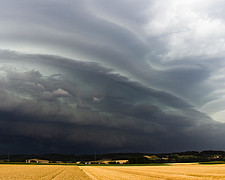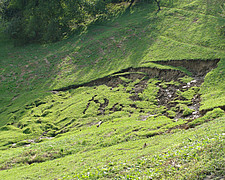Regional Climate Research Themes
The Regional Climate Research Group aims to understand climate processes shaping regional climate variability and change, changes in regional climate and the associated uncertainties for climate risk assessment, and to improve the interface with climate change impact research. A focus is on future weather and extreme events. We study the climate of Europe and the European Alps, but also consider other relevant climates. Our research is based on climate model simulations of the 21st century, climate model sensitivity studies, analyses and simulations of individual events, the analysis of existing global and regional climate model ensembles, and the analysis of observational data. We contribute to high level international activities, for instance within WCRP and the IPCC.
Regional Climate Processes

Regional climate is determined by weather processes and interactions across a broad range of spatial and temporal scales. These driving factors also influence natural climate variability and regional climate change. Understanding these factors is therefore crucial to generate credible regional climate projections, in particular for weather extremes.
- understand climate processes with a focus on extreme events (including compound events) and interactions between these processes across all scales;
- understand the impact of past and future global climate change on regional climate, in particular extreme events;
- understand the predictability of climate across time scales, and changes in predictability in a warmer climate;
- assess the ability of global and regional climate models to represent these processes, and to attribute model biases to the representation of particular processes;
- conduct climate model sensitivity simulations and idealised experiments to study these processes.
Regional Climate Change

Regional climate projections are in many cases affected with substantial uncertainties. It is, for instance, still not clear how the number and duration of persistent heavy precipitation and drought changes in a warming climate. Comprehensive statistical analyses and comparisons of different climate models and observational datasets are therefore needed to generate robust climate projections.
-
understand the skill and uncertainties of climate projections at regional scales. This involves assessing model fitness, exploring deep uncertainties in simulating regional climate change (in particular for extreme events) and understanding contradictions across multiple lines of evidence;
-
explore the range of plausible climatic changes as a basis for climate risk assessment;
-
understand the added value of higher-resolution climate modeling for simulating regional climate change;
-
generate high-resolution climate scenarios, e.g., for the Alpine region, including storylines of physically consistent evolutions of regional future climate; and future storylines of individual event.
Interface with climate impact research

In general, regional climate data cannot directly be used by users: model simulations have to be selected, analysed, statistically postprocessed and interpreted depending on the user context and for the specific application. A close collaboration with users therefore improves the applicability and relevance of regional climate information.
-
understand the information requirements and context of different types of users;
-
develop and apply methods to truly tailor climate projections for users;
-
develop new co-design approaches for climate service provision.







